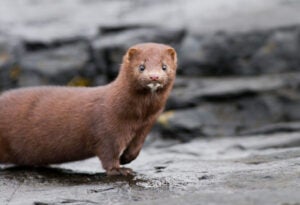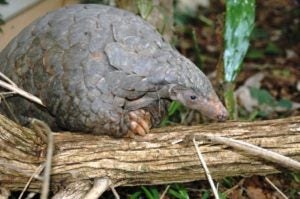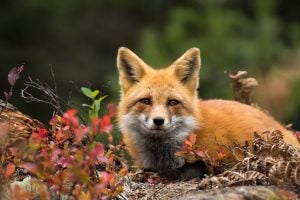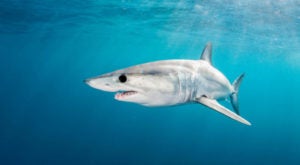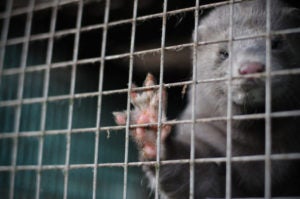
Dove and The Body Shop have joined PETA, Cruelty Free Europe, Humane Society International/Europe, Eurogroup for Animals and the ECEAE (representing a total of 100 member organisations from 26 EU member states*) to urgently mobilise 1 million European citizens and save cruelty-free cosmetics in Europe, following threats to Europe’s longstanding ban on animal testing for cosmetics.
In 2004, after decades of campaigning by consumers, animal protection organisations and several companies, the European Union banned the testing of cosmetics products on animals. In 2009, it prohibited tests for cosmetics ingredients and, finally, in 2013 it prohibited the sale of cosmetics that had been tested on animals. The EU’s approach became the blueprint for regulatory change in countries around the world.
ECHA is proposing new animal testing on ingredients that are known to be safe.
Yet, recent test requirements from the European Chemicals Agency (ECHA) effectively destroy the bans and threaten the additional progress the European Parliament has been boldy calling for since 2018 – a global ban on all animal testing for cosmetics by 2023.
ECHA is calling for new animal testing on ingredients that have been safely used by consumers and handled safely in factories for many years – even those solely used for cosmetics. If this goes ahead, millions more animals could be subjected to cruel tests when there are other ways to generate safety data.
The time to act is now.
The two beauty brands have come together with NGOs to galvanise consumers to take action to save Europe’s ban on animal testing by signing a European Citizens Initiative – a petition-like mechanism for EU Citizens to help shape the EU by calling on the European Commission to propose new laws.
Animal testing for cosmetics is not necessary to ensure safety thanks to modern, human-relevant, non-animal scientific methods, which safety scientists have been developing and using for decades.
Speaking with a united voice to end animal testing for beauty products, The Body Shop, Dove and animal protection organisations are calling on consumers to sign a European Citizens Initiative, demanding that the European Commission:
1. Protect and strengthen the cosmetics animal testing ban
Initiate legislative change to achieve consumer, worker and environmental protection for all cosmetics ingredients without new tests with animals for any purpose at any time.
2. Transform EU chemicals regulation
Ensure human health and the environment are protected by managing chemicals without the addition of new animal testing requirements.
3. Modernise regulatory science in the EU
Commit, before the end of its current term of office, to a legislative proposal plotting a road map to phase out all animal testing in the EU.
Together, they aim to get to 1 million signatures in the fastest time ever for a European Citizens Initiative – sending a clear message that ECHA’s demands for new testing break with the policy of animal testing as a last resort, backed by the European Commission, and break the wishes of EU citizens.
But they can’t do it alone.
European citizens can sign the Initiative here and tell the Commission they won’t accept broken promises from Europe, or regulations that mean animals suffer and die for cosmetics.
Joint animal protection groups state: “Polls show that three quarters of adults in EU member states agree that animal testing for cosmetic products and their ingredients is unacceptable in all circumstances, and 70% back a phase-out plan for all animal testing. It’s sad that once again we have to fight a battle that Europe’s citizens thought they had already won, but with a successful European Citizens Initiative, we can make decision-makers listen, protect the ground-breaking bans and secure concerted action to end the suffering of animals in EU laboratories for good**:
Dove has spent 15 years working to change the beauty industry for the better, starting with ‘Campaign for Real Beauty’ and launching the world’s biggest self-esteem programme. As a proudly certified cruelty-free brand, Dove has supported global bans to permanently end animal testing everywhere in the world, working alongside lawmakers, animal protection organisations and like-minded companies to achieve this goal.
Firdaous El Honsali, Senior Director of Global Communications and Sustainability at Dove, says: “At Dove, we stand passionately against animal cruelty. We strongly believe that there is no role for animal testing for beauty products or their ingredients and have pioneered safe and humane alternatives to assess the safety of products and ingredients for many years. This commitment drives us to take urgent action to protect the ban against animal testing in the EU. Together with our partners, The Body Shop and leading animal protection groups, we urge both our peers in the beauty industry and the general public to lend their voice in the fight to end animal testing in the EU once and for all by signing this European Citizens Initiative.”
The Body Shop has been campaigning relentlessly against the practice of animal testing for cosmetics since 1989 – helping to lead the charge towards the current ban in Europe.
Christopher Davis, Global CSR and Activism Director, The Body Shop International, adds: “The Body Shop was the first global beauty brand to fight against animal testing in cosmetics and this commitment has been at the forefront of our activist campaigns for over three decades. Our work with our campaign partners Cruelty Free International led to the original European Union ban in 2013. Today, we are calling the EU – home to the world’s largest cosmetics market – to stick to the trailblazing promise they made. We are proud to collaborate with Dove and speak as one voice, along with all those working towards a global end to animal testing for cosmetics, in support of this European Citizen’s Initiative.”
EU timeline on animal testing
2004: EU implements a ban on animal testing for finished cosmetic products.
2009: A ban on animal testing for cosmetic ingredients and combinations of ingredients is introduced as well as a marketing ban for all human health effects with the exception of repeated-dose toxicity, reproductive toxicity and toxicokinetics.
2013: A complete marketing ban for cosmetics containing ingredients tested on animals strengthens the existing bans.
2018: European Parliament adopts a resolution calling for a global ban on animal testing – establishing Europe’s role as a world leader in the fight against animal cruelty.
2021: In recent years ECHA has called for tens of thousands of animals to be used in cosmetics ingredients tests
NOTES TO EDITORS
- *Animal protection organisations behind the European Citizens Initiative:
- People for the Ethical Treatment of Animals and its affiliates in Germany, France and the Netherlands
- Cruelty Free Europe
- Humane Society International/Europe and its affiliates in Germany, Italy, Poland and Romania
- Eurogroup for Animals
- European Coalition to End Animal Experiments
- **A European-wide survey among the public to gauge perceptions of animal testing in the EU.

